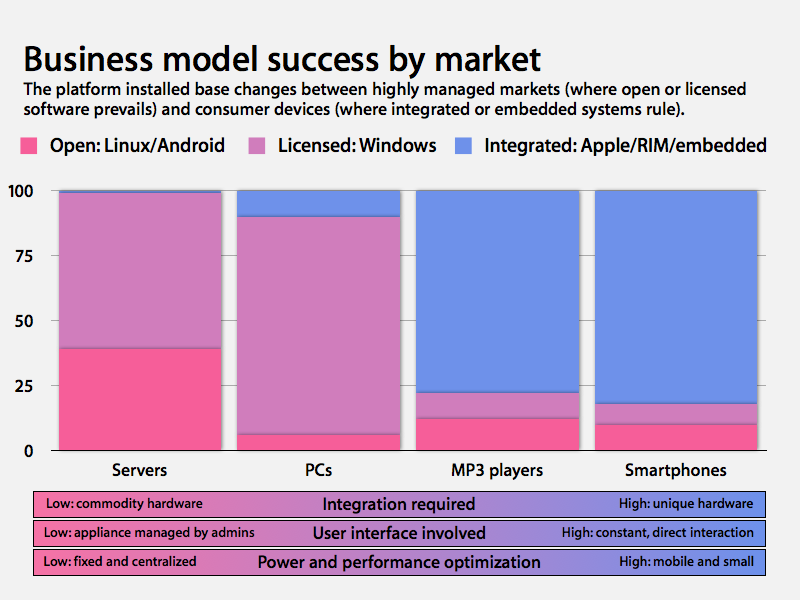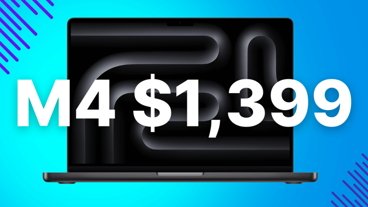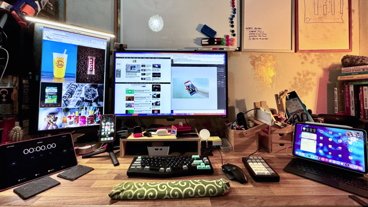Speaking at the Consumer Electronics Show in Las Vegas, Microsoft’s Robbie Bach, president of the company's Entertainment & Devices Division, told Bloomberg that he envisioned that Google's foray into directly selling and marking the phone could scare away other Android licensees.
“Doing both in the way they are trying to do both is actually very, very difficult,†Bach said. “Google’s announcement sends a signal where they’re going to place their commitment. That will create some opportunities for us and we’ll pursue them.â€
Speaking from experience
Bach presided over Microsoft's own "PlaysForSure" Windows Media strategy for delivering a licensed software platform that hardware makers could use to build MP3 players, in competition with Apple's iPod. When that program failed to gain much traction, Microsoft took matters into its own hands by announcing a plan to deliver a Microsoft-branded Windows Media player under the Zune brand.
The company insisted that the Zune would only compete against Apple's iPod, leaving PlaysForSure licensees to continue their growth in parallel. However, as was obviously the case even at the time, the Zune only managed to kill off PlaysForSure devices and assume their small share of the overall MP3 market without making any progress into Apple's territory.
Bach recently told analysts who were critical of the company's foray into music players that it continues to feel it has a shot in the music business and that it views the market as critical to the company's overall strategy. However, he also admitted that given the chance to do things over, the company would have done things differently, although he didn't explain what he thought would have worked better.
Regardless of the path Microsoft had taken, its Windows Media platform appeared headed for disaster. Without the Zune, the company would be dealing with the same kinds of problems that it faces in smartphones, where it has (so far) avoided releasing its own branded phone in deference to its Windows Mobile licensees, primarily HTC.
But that alternative strategy hasn't stopped Microsoft's phone platform from quickly sliding into irrelevance in terms of actual sales, consumer mindshare nor in developer attention. Consumer products benefit from tight integration to a greater degree than PCs, where Microsoft has successfully ruled the roost as the world's dominant PC operating system provider.
Microsoft vs Google: don't follow our lead
Bach's warnings to Google aren't the first time a Microsoft executive has scoffed at its rival for doing the same thing it had done previously. Chief executive Steve Ballmer laughed off Google's Chrome OS initiative last summer, telling the crowd at the company's Worldwide Partner Conference, "I don't know if they can't make up their mind or what the problem is over there, but the last time I checked, you don't need two client operating systems [Android and Chrome OS]. It's good to have one."
Ballmer's comments were curious because his own company maintained two distinct PC operating systems throughout most of the 90s: the consumer Windows 95/98/ME based on DOS, and the completely separate Windows NT/2000 operating system it targeted at business users.
Additionally, the company launched the entirely new Windows CE operating system targeted at handheld devices and embedded apps in parallel to its desktop offerings. Even today, Microsoft still maintains two very different client operating systems in its primary offerings: Windows 7 for desktop PCs and the Windows CE-based Windows Mobile platform.
The company is also struggling to wean PC users and licensees from Windows XP to the latest Windows 7 release, so that the company can at least narrow down its primary support efforts to one PC client operating system. It's not there yet.
Microsoft vs Google: don't follow our lead
Google isn't managing its Android platform as strictly as Microsoft ran Windows, allowing its licensees to incorporate their own user interfaces and not forcing them to follow a strong reference design in terms of hardware. This may allow the company to escape from the same fate Microsoft faced with the Zune, and allow the company to successfully do what Microsoft hasn't yet dared: ship smartphones and PC devices that directly compete with its partners.
At the same time, Google's Nexus One has almost universally been described by tech observers as a "Droid killer" in reference to its one-upmanship of last season's flagship Android model. The company has tried to play off any threat by advertising the Droid as Verizon's alternative to Nexus One for users who prefer that carrier. However, it has also announced plans to bring its own branded model to Verizon in the near future.
Whether this will alienate Motorola as an Android partner just after the company focused all of its resources on Google's platform remains to be seen. Google has indicated that it may launch new Nexus One successors in partnership with other manufacturers.
The move may also intimidate the beleaguered Sony Ericsson, which has floundered from Windows Mobile to Symbian to Android looking for a sophisticated phone platform that could allow it to compete with the iPhone. Sony has indicated that it will pull out of its partnership with Ericsson if the group does not return to profitability, a move that would kill what is the third most significant Android licensee.
Meanwhile, LG has worked to keep one foot firmly planted in the Windows Mobile camp while talking about Android products, while Samsung has announced that it will launch its own Bada platform rather than focusing on Android. Even the maker of the Nexus One, HTC, has floated the plan to build BREW phones that it can sell for cheaper than its array of Android or Windows Mobile devices.
The more different competitors Apple faces in smartphones, the better it fares. One major reason why Apple lost its pioneering position in graphical desktop PCs to Microsoft in the 90s was related to the company's efforts to stamp out rivals in "look and feel" lawsuits during the late 80s that shut down windowing products from HP and GEM, leaving Microsoft free rein to consolidate a competitive-free monopoly juggernaut around its own Windows product.
In this decade, Apple has conspicuously refrained from attacking rivals on copyright or patent infringement issues in both the iPod and iPhone markets, outside of defensive measures it has taken against patent challenges from Creative and more recently Nokia. Competing in the market has historically worked out much more successfully for Apple than trying to compete in court.
 Prince McLean
Prince McLean







-m.jpg)






 Christine McKee
Christine McKee
 Malcolm Owen
Malcolm Owen

 Sponsored Content
Sponsored Content

 Amber Neely
Amber Neely











76 Comments
The first graph is wrong. The smartphone column should be mostly open now that Symbian is open. At the very least it should be mostly licensed.
Quote: Microsoft vs Google: don't follow our lead
Best advice Microsoft can give to anyone.
At the same time, Google's Nexus One has almost universally been described by tech observers as a "Droid killer" in reference to its one-upmanship of last season's flagship Android model. The company has tried to play off any threat by advertising the Droid as Verizon's alternative to Nexus One for users who prefer that carrier. However, it has also announced plans to bring its own branded model to Verizon in the near future.
Whether this will alienate Motorola as an Android partner just after the company focused all of its resources on Google's platform remains to be seen.
One way of confirming the alienation would be for Motorola to make a bid for Palm.
Of course they would say this, Google is direct competition. They hit Google, Droid, and any Android variant.
They can use the losses in Zune to prop up Windows based phones. Great way to get their investment back.
The company is also struggling to wean PC users and licensees from Windows XP to the latest Windows 7 release, so that the company can at least narrow down its primary support efforts to one PC client operating system. It's not there yet.
I was under the impression Microsoft issued a July 2010 cutoff for XP users for support. Personally Windows 7 blows XP out the water so those who choose not to upgrade (probably because they are running ancient PCs) are just stupid not to do so, and even netbooks can run Windows 7 without choking out.
If only MS made a Zune phone...but id settle just for Zune on mac to begin with.